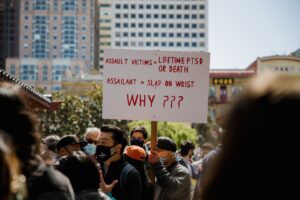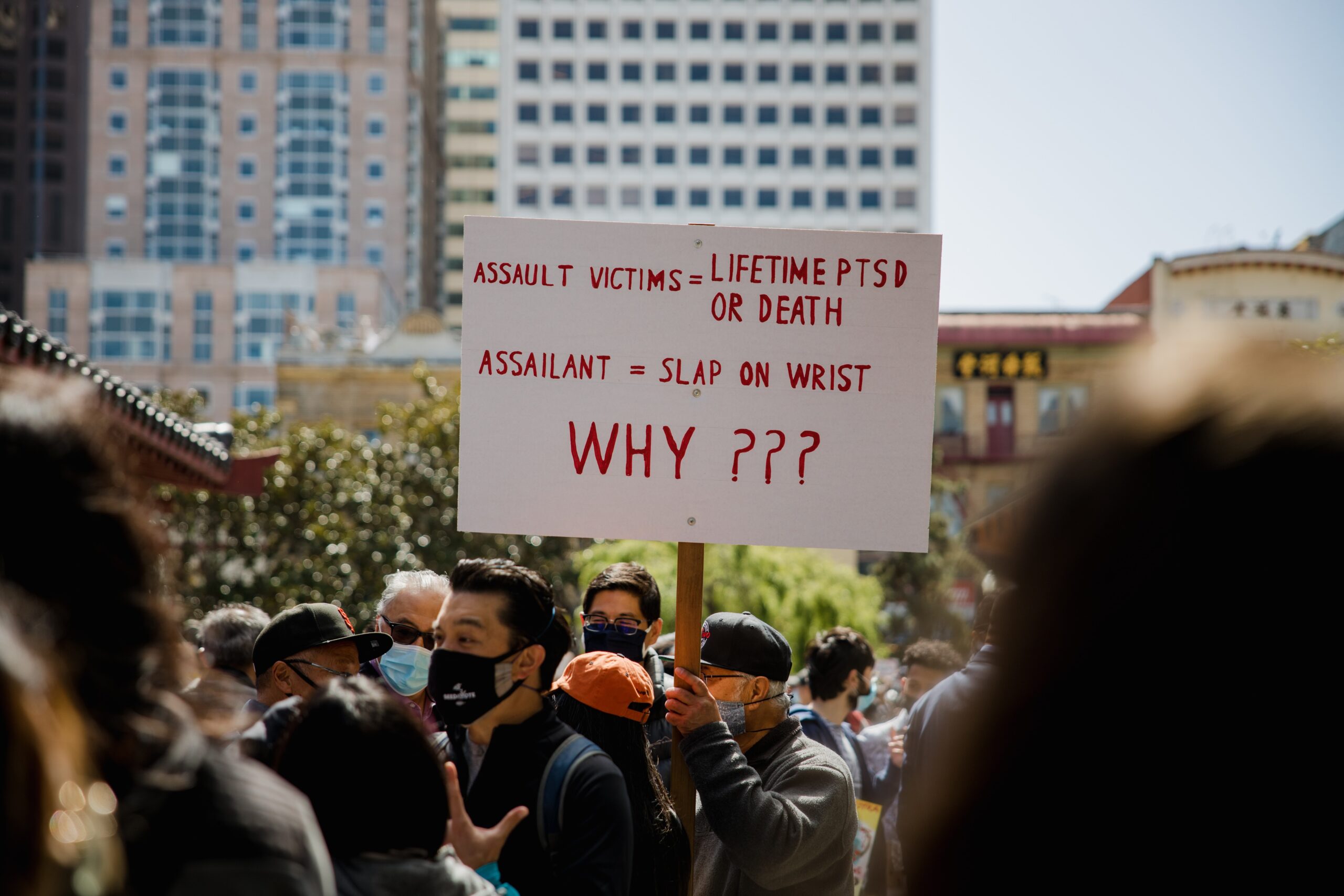How To Deal With Emotional Distress Caused By Hate Crime
Delaina Ashley Yaun, Paul Andre Michels, Yong Ae Yue, Soon Chung Park, Daoyou Feng, Hyun Jung Grant, Suncha Kim, Xiaojie Tan. These are the names of the people that tragically lost their lives during the Atlanta, Georgia spa shootings of March 16, 2021. Mind Connections offers our deepest condolences to the families and loved ones of the victims.
The Surge of Hate Crime and Racism Against AAPI:
Discrimination against Asian-Americans has increased vastly. The reported hate crimes of this population have risen by 149% from 2019 to 2020. Although some officials believe that the shooter did not have a bias when killing the 8 victims, six more Asian Americans have devastatingly lost their lives in America. This is beyond unacceptable and shines light on the Anti-Asian sentiments the COVID-19 pandemic has ignited.
When someone commits a hate crime, they are motivated by bias. Offenders can hold prejudice against populations of race, disability, sexual orientation, religion, etc. The United States Department of Justice reported that in 2019, 57.6% of Single-bias Incidents were due to Race/Ethnicity/Ancestry. Next to it, the other highest reports targeted groups based on religion and sexual orientation.
The COVID-19 pandemic has spread not only disease and loss around the world but has also fueled prejudice against AAPI (Asian Americans and Pacific Islanders). Asian Americans have always had to deal with racism in America. Like many other marginalized groups, Asian Americans have experienced stereotype, slurs used against them, and jokes made at their expense. Besides the ongoing racism, physical attacks such as assault, being coughed on, being spat on, etc., became even more prevalent as the pandemic spread. AAPI have not only experienced physical effects from COVID-19 but emotional ones, as well.
Hate Crimes and the Psychological Effects on Individuals and Communities:

Discrimination and hate-crimes produce harmful effects on victims’ mental health. That is, the sufferers can struggle with psychological distress, anxiety, depression, and PTSD.
Hate crimes can cause psychological distress in victims. When someone has psychological distress, these emotions can be very taxing on their mental health. The immense emotional toll sufferers endure can disrupt their lives and become increasingly difficult to cope with. Research has consistently shown that certain kinds of stressors are particularly harmful to health, including those that are uncontrollable and unpredictable. In general, these stressors are common in hate crimes and discrimination.
The COVID-19 pandemic has elevated the numbers of hate-crimes towards Asian Americans. Research suggests that discrimination can cause people to experience elevated psychological distress.
Anxiety and Depression:
First of all, hate crimes can contribute to development of anxiety and depression. After being attacked, it is hard not to feel scared, angry, or even shamed. When you keep these emotions to yourself, it is very likely to have psychological issues. Specifically, unexpressed anger can turn inward, helpless and frustrating feelings continue to accumulate, negative self-talk and self-doubt become more frequent, eventually depression could be inevitable.
Many people who want to promote racist ideals in this country blame the COVID-19 pandemic on AAPI. Wrongly attributing the cause of a horrible pandemic on AAPI fuels prejudice and bias against this entire population. Meanwhile it could dangerously affect AAPI’s overall safety and mental health. The pandemic has brought hardships to all people. In other words, every person experiencing the pandemic’s effects is at risk of declining mental and physical wellness. Researchers Tessler, Choi, and Kao point out that Asian-Americans have to deal with the standard COVID-19 stressors, such as isolation, fear of contracting the virus, exacerbated health anxiety, loneliness, etc. On top of all these, they experience heightened anxiety due to wrong judgment, accusation, or abuse, both emotionally and physically.
Trauma, PTSD, and anxiety:
It goes without saying, hate crimes have lasting effects on victims. When someone experiences a hate crime, any illusion of safety this person once had is shattered. The victims may develop a fear of harm again the next time they go out in public.
After experiencing or witnessing a hate crime, a person might have a trauma response and develop PTSD. To be more specific, PTSD is a type of anxiety that can be triggered by a horrific event you witnessed, directly experienced, learned about, or had exposure to repeatedly.
You don’t need to experience hate crime firsthand to have trauma or to suffer from mental health issues. For example, when you watch news reports of violence, when you witness what happened to your friends, neighbors, and people in your community, when you know that the terrible hate crime could happen to you or your loved ones simply because of your race or ethnicity, you could expect to feel threatened, afraid, anxious, helpless, and depressed.
Healing from this kind of trauma must occur on a societal and individual level. Part of overcoming trauma is processing what happened to you, feeling the full pain of it, and making sense of the experience.
Language Barriers and Limited Access to Services:
What’s worse, some people who experience hate crimes may not be able to vocalize or share their experiences due to language barrier. This, along with limited access to proper services and support, can make it difficult for victims to receive the necessary care they require after experiencing discrimination.
Lack of Empathy and Support
In fact, many people fear sharing their experiences when it comes to abuse, violence, or hate crimes. This fear stems from the potential negative or unsupportive reactions others might display. Actually some people don’t even attempt to empathize with the victim and instead downplay their experience. This emotional gaslighting is infamous in sexual assault cases; namely, there have been silence, ignorance, hints, or messages that their cases were not believable. Refusing to support victims is dangerous because it protects the abuser and can leave the door open for future attacks.
If the victim feels that they do not have the proper support to lean on during these difficult times, they might be forced to hold their emotions in. This emotional oppression can cause a victim to internalize anger, shame, and any other negative emotion that comes along with experiencing a hate crime. Inevitably this will only hurt the sufferer even more.
How to Deal with Emotional Distress Caused by Hate Crimes

When you face emotional distress, know that healing can come from counseling, spirituality, seeking justice, and social support. Here are some ways to help to cope during a hate crime:
Accept your emotions.
Undoubtedly it is normal to feel angry, upset, or hopeless during this time. Besides, it is normal to want to bottle up your experiences of racism or try to pretend that they haven’t affected you. However, it is also important to know that keeping painful feelings to yourself can adversely impact your physical and mental health. Therefore, the first step of healing is to acknowledge and accept the existence of such difficult emotions.
Connect with people you trust.
The second step of healing is to openly and honestly share your experiences with others. Connect with your family, friends, faith community, and share your thoughts and feelings so that you don’t feel too alone. The simple act of talking with someone can make you feel heard and understood. In effect, this talking process can trigger hormones that calm your nervous system, relieve stress, and ease the symptoms of depression and anxiety.
Look for support within your community.
If you feel that you don’t have any friends or family who will listen without negatively judging you, try reaching out to a cultural or community center, school or youth counselor, sports coach, religious organization, like-minded people on social media, or a respected neighbor in your area.
Listen to and support others.
The fourth step, make yourself available to support others just as you would like them to support you. Listening attentively to another person’s experiences of racism can be just as beneficial for you as it is for them. Overall, supporting others can help to reduce your own stress, combat feelings of isolation and depression, and protect your mental health.
Stand in Solidarity to Fight Racism
If you have been a victim of a hate crime, know that you deserve to navigate this world without fear of discrimination or violence. You may be experiencing troubling emotions – this might be a good time to reach out to your support systems and talk to them about how you feel. If you decide to turn to a professional, know that therapy can help you cope with this event in a healthy and effective way. There are also virtual resources that can be helpful to look at during this time.
If someone you know has gone through a hate crime, they need your support. Anyone who experiences a hate crime has been through a horrendous act of discrimination. Listen to your friend, allow them to vent, validate their experience, and (if they wish) help them find beneficial resources.
Ways to Validate Someone’s Experience:
- Allow them to tell you what happened without interrupting or interjecting
- Support whatever path they wish to take in dealing with this situation. You may love this person and want to help, but refrain from pushing what you think is best for them. Instead, honor what actions they are ready for presently
- Refrain from phrases that might promote feelings of shame in a person. Instead of saying, “What happened to you is disgusting,” respond with a statement like, “I fully heard everything you have told me. Any feelings you have in response to this situation are valid, and you do not deserve what happened to you”
- Make your support clear and remind them that they can always rely on you in tough situations like this
Your Voice Matters
If you are outraged by the discriminatory violence and sentiments in the world, use your voice! Your opinion matters! Sign a petition, engage in the conversation on social media, and find other people who are passionate about putting an end to hatred. Your advocacy for equality and justice will contribute to a more inclusive, accepting, and uplifting world.
Find Pride in Community

Researchers Herek, Gillis, and Cogan found that, compared to victims of nonbias crimes, the effects on the mental health and world outlook for lesbian and gay victims were more detrimental. Hate crimes are personal and are a threat to the identity of a victim. After getting targeted for being who they are, the sexual identity of a lesbian or gay victim can start to emit negative connotations in the person – the victim may feel like their identity caused them violence, puts them in danger, etc.
Being part of the LGBTQIA+ community is something to be celebrated and proud of. When someone surrounds themself with fellow members of their community, these people can channel immense resilience and pride. This group strength is found in ethnic groups, as well. In a 2020 study, researchers found that when Asian-Americans embrace their ethnic identity, it can help alleviate feelings of depression.
Be proud of who you are, and never allow the ignorance of other people to make you doubt your infinite worth!



